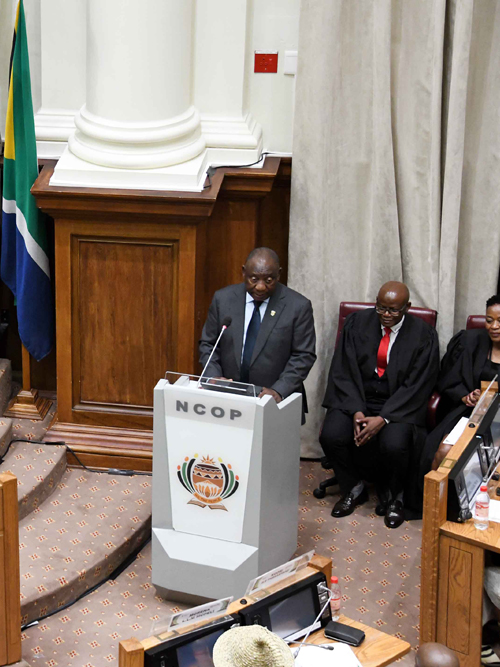Chairperson of the National House of Traditional and Khoi-San Leaders, Kgosi Thabo Milton Seatlholo, Rapulana!
Deputy Chairperson of the National House of Traditional and Khoi-San Leaders, Inkosi Mavuso Langa, Ah! Zwelidumile,
Your Majesties, Kings and Queens,
Chairperson of the National Council of Provinces, Mr Amos Masondo,
Speaker of the National Assembly, Ms Nosiviwe Mapisa-Nqakula,
Minister of Cooperative Governance and Traditional Affairs, Ms Thembi Nkadimeng,
Ministers and Deputy Ministers,
Premiers,
Chairpersons and Deputy Chairpersons of Provincial Houses of Traditional and Khoi-San Leaders,
The President and Deputy Presidents of Contralesa and Rolesa,
Chairperson of the National Khoi-San Council, Mr Cecil le Fleur,
Leaders of political parties,
Representatives of Chapter 9 Institutions,
Directors-General and officials,
Guests,
Ladies and Gentlemen
It is an honour for me once again to address the National House of Traditional and Khoi-San Leaders.
This is a particular important year, in which we celebrate 30 years since attaining our freedom.
As we gather here today, we keenly feel a great void left by Prince Mangosuthu Buthelezi, who passed away last year.
Beyond being a fount of knowledge with respect to the institution of traditional leadership, Umntwana wakwaPhindangene was always seated here, on these benches, at the annual opening of this House.
We always would look forward to his participation in the debate and to his eloquence. He is indeed sorely missed.
Let me take this opportunity to condemn in the strongest terms the rise in killings of traditional leaders, especially in KwaZulu-Natal.
Our law enforcement agencies are hard at work to ensure that those responsible are brought to book.
On behalf of government, I wish to pass our deepest condolences to all families for the loss of their loved ones and to you for the loss of your colleagues.
May their souls and those of other traditional leaders who passed on since the last opening of the House continue to rest in peace.
Honourable Members,
In my State of the Nation Address delivered earlier this month, I reflected on the journey we have traversed over the past 30 years since attaining our freedom.
I outlined the indisputable gains we have made as a country not only in giving effect to the values of our noble Constitution, but in improving the lives of millions of our citizens.
Yes, we certainly have much further to go.
But it is incumbent on us to consolidate these gains as we chart the course for a new, better future where there is shared prosperity, true freedom and meaningful equality. We strive to achieve a society where no one is left behind.
As a nation we can also be proud of the journey we have travelled according to the institution of traditional leadership and the stature it deserves.
Today, our Kings are recognised as Kings as opposed to Paramount Chiefs, a term which colonial and apartheid rule introduced to make it clear that in their minds the real Kings were only those found in Europe.
Today we have a National House of Traditional and Khoi-San Leaders that plays an active and meaningful role in our national life.
We do of course wish that more of our Khoi-San leaders are brought into the fold, and are formally recognised under the Traditional and Khoi-San Leadership Act.
The Commission on Khoi-San Matters has been appointed to receive and assess applications for recognition and make recommendations to the Minister.
This process is taking longer than was initially envisaged, but it is my humble appeal that we allow the Commission the space to continue with this complex historical mission that they have been assigned.
Chairperson,
As government we remain committed to working with the institution of traditional leadership in pursuit of progress and development. We did so extremely successfully during the COVID-19 pandemic, during recent floods, and in a number of other areas.
We are working together to combat gender-based violence, the scourge that is tearing our communities apart.
I have just returned from the annual Summit of Heads of State and Government of the African Union, where we participated in a high-level event on promoting positive masculinity across our continent.
We need to be doing more in our communities to bring men into this effort, and focus on prevention and awareness raising.
Personally, I have been engaging with young men through peer dialogues where they are able to speak openly about what masculinity and manhood means to them, and also commit themselves to playing their part to end gender-based violence.
I call on our male traditional leaders to be part of this effort and to start their own men’s dialogues. The influence and stature you bring to bear can and does make a difference, given the role that cultural norms and practices often play in perpetuating violence against women and girls.
Furthermore, this House’s partnership with Parliament and the SANAC Men’s Parliament is greatly appreciated, and should continue to enjoy the support of our traditional leaders.
This spirit of unity should continue as we work together to bring development to our communities.
Chairperson,
Climate change is a growing concern in South Africa. The recent flooding we have experienced, together with other extreme weather events, are a stark reminder that we cannot be complacent about this grave threat to both lives and livelihoods.
It is pleasing to note that the institution of traditional and Khoi-San leadership is once again playing its role to assist communities.
I specifically wish to commend the work done by the structure of spouses and female traditional leaders called uMgogodla kaZulu during the floods that engulfed KwaZulu-Natal.
The Ondlunkulu stood up in partnership with the Al-Imdaad, Old Mutual, Princess Gabo and Kaizer Junior Foundations and others to help those who were affected by floods.
We appreciate this valuable work.
I have been advised that several other provinces have formalised the structures of spouses and women traditional leaders of amaKhosi. We implore this House to continue working together with provincial houses to ensure that such structures are established and capacitated.
Drug abuse is another serious challenge in our communities. It is encouraging to note that this House is working with the Central Drug Authority to support its work.
I urge you as this House to encourage provinces and local Houses to establish relationships with community organisations to fight the scourge of drugs together.
We have a shared responsibility to work together to address our country’s unemployment crisis, particularly among young people
The Presidential Youth Employment Intervention, the National Youth Service and the Youth Employment Service are just some of the initiatives we are implementing that are making a difference.
I call on this House to play an active role in the ongoing process of recruiting young people into the National Rural Youth Service Corps that is being coordinated by the Department of Agriculture, Land Reform and Rural Development.
The InvestRural blueprint handed over to me by the former Chairperson of this House, the late iNkosi Mahlangu, is being fused into government programmes.
The training of young people by the Department of Agriculture, Land Reform and Rural Development is a practical example of this. Another is the work being done by the Department of Traditional Affairs in partnership with the Department of Mineral Resources and Energy to streamline and integrate Social Labour Plans into industry operations.
The Welisizwe Rural Bridges Programme coordinated by the Department of Public Works and Infrastructure is yet another example of positive and meaningful change being brought to rural areas. Just last month I attended the launch of one of these bridges in KwaZulu-Natal.
To witness the difference these bridges are making in the lives of rural communities, especially for young learners who need to cross rivers to get to school, is remarkable.
I believe Minister Sihle Zikalala shared the details of this programme with this House at the Xivijo in Bloemfontein last year.
We know that capacity building is essential if we are to enhance the role traditional leaders play in development.
In this regard, we welcome the partnership between the Department of Traditional Affairs and the National School of Government to provide training on, among others, the facilitating socio-economic development for traditional communities.
The programme is aimed at empowering traditional leaders to act as change agents in their communities, and to transfer new knowledge and skills so we can initiate sustainable economic interventions in our rural areas.
Our goal is an active rural citizenry with our traditional leaders at the helm.
The issue of transferring communal land to traditional councils is one of great interest to this House.
As government we are in the process of finalising the bill on communal land, which will be followed by extensive consultations.
I know that this process is taking longer than expected, but democracy requires that we give society a voice in matters that concern them.
The challenges facing initiation should be decisively addressed. We cannot continue to have customary initiation being turned into a harmful practice.
We need to do all in our powers as government, communities, traditional leaders, the National Initiation Oversight Committee and provincial structures to put to an end to these unnecessary and entirely avoidable deaths and injuries.
I urge this House to continue to monitor and guide provinces and various local houses on the provisions of the Customary Initiation Act.
We must live up to the slogan of Mabaye Baphila Babuye Baphila.
Another matter that has been outstanding for some time in our programme is the Traditional Courts Act. I have now assented to the Act and will soon be proclaiming the date on which it comes into effect.
In the meantime, the Department of Justice and Constitutional Development and the Department of Traditional Affairs have started with some of the preparatory work that will facilitate implementation.
This includes visiting some of the traditional councils to further discuss their approaches to alternative dispute resolution and the resources they deploy in this regard.
This is a matter on which we have finally made good progress.
We have had concerns expressed to us by this House with regards to involving traditional leadership more in the work of the Inter-Ministerial task Team. The Deputy President and myself are seized with the matter of ensuring that members of this House are invited to workstream meetings and are able to participate more fully.
On the 29th of May, South Africans will be going to the polls to vote in our seventh democratic elections for national and provincial government.
As we prepare for this historic occasion, I once again urge traditional leaders to continue to encourage all eligible voters to register and participate in these elections.
As we have done before, we call on traditional leaders to actively promote free and fair campaigning, and to ensure that all voters can exercise their democratic right.
May you remain with the spirit of our forebears who never retreated when challenges were facing them. Working side by side, we will move forward.
Ke a leboga. Ngiyathokoza. Ngiyabonga. Dankie.
I thank you.








